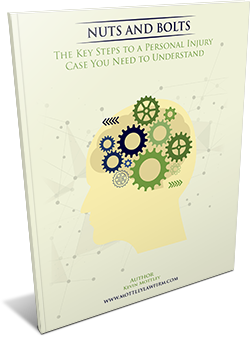Who Pays the Ambulance Bill After a Truck Crash
On Virginia roads and highways, truck accidents can be the cause of serious injuries. Even if injuries aren’t life-threatening, truck crash victims may need to be transported to the nearest hospital as quickly as possible—and if they’re incapacitated, they may not have a say in the type of emergency transport. On average, an ambulance bill can exceed $1,000 but may reach as high as $15,000, depending on distance, type of ambulance, and level of care. Airlift by helicopter can cost as much as $30,000.
To clarify who’s at fault for your truck accident and define your ambulance bill payment options, consult with the skilled legal team at The Mottley Law Firm today. 
VA Ambulance Bill Payment Options and Scenarios
The first priority for drivers and car accident passengers is to get emergency medical care to assess and treat their injuries.
Injuries can be substantial, especially in accidents with large commercial trucks, and may even be life-or-death situations. While first responders call for emergency transport, insurance companies may disregard this decision. Insurers may only cover the full ambulance bill if the service was determined “medically necessary.”
In principle, the party at fault should be responsible for paying for ambulance expenses, but it may depend on who has insurance and the type of coverage. Work with the skilled Virginia accident attorneys at The Mottley Law Firm to avoid being stuck with the bill when someone else can and should be paying for it.
Truck Driver at Fault and Insured
Unlike no-fault insurance states, Virginia places full responsibility on the at-fault party in a motor vehicle accident—this typically means they must pay for a victim’s losses and expenses, including ambulance bills. With regular car accidents, liability usually lands on the driver and their insurance company. A common myth is that crashes with commercial trucks work the same way. This isn’t always the case.
Fleet companies must adhere to minimum commercial truck insurance requirements based on vehicle and cargo weight. But even when a truck operator might have caused the accident, victims may seek damages from other sources, including:
- A trucking company
- The commercial vehicle’s owner
- Truck and part manufacturers
- Maintenance crews and mechanics
- Cargo loading staff and other personnel
While an insurance claim might cover some of your financial recovery, some cases require a personal injury lawsuit. Both processes can be slow and are best navigated with the help of a Virginia personal injury lawyer.
Other Driver at Fault and Not Insured
The situation becomes more complicated if the at-fault truck driver doesn’t have insurance to cover your ambulance bill. Or, they may not have enough insurance coverage to compensate for all your accident-related economic and non-economic damages. However, you have a legal right to file a personal injury lawsuit against wrongdoers to recover costs.
Another option is if you have Personal Injury Protection (PIP) coverage as part of your insurance policy. PIP may be able to pay for your emergency transport after a truck accident. However, a PIP policy in Virginia is often quite modest—usual coverage is approximately $1,000–$5,000, although some insurers offer more. Either way, it doesn’t take much to exceed its limits.
You’re at Fault and Fully Insured
In cases where you’re at fault and hurt in a truck accident, you may not need to pay for the expensive ambulance bill out of your own pocket. Code of Virginia § 38.2-2201 outlines provisions for the payment of medical expenses and the assignment of certain benefits.
It states you may be “entitled to payment from your automobile insurance if you have medical expense benefits coverage.” This includes not just costs associated with hospital stays and emergency medical care, but also ambulance transport. By filing a claim, you typically give your health care provider the right to receive payment directly from your insurer. Not all car insurance policies have this coverage. It’s important to clarify with your carrier what is and isn’t covered.
Another possible option is to file a claim with your health insurance company. Some auto policies may require the health insurer to pay first, with car insurance acting as a secondary provider. Health insurance deductibles and copays are often higher than auto insurance, though. It’s prudent to discuss all your options with your Richmond truck accident lawyer before making any decisions.



